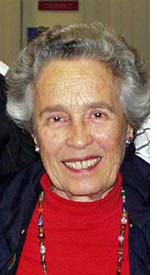By Eileen Wingard
SAN DIEGO — Next year marks the 30th anniversary of the death of the greatest exponent of the Yiddish Art Song, Lazar Weiner (1897-1982). His settings of folk songs, and his original music for the work of contemporary Yiddish poets, followed in the tradition of lieder composers such as Schubert, Schumann and Brahms.
One of the Milken Archive of American Jewish Music’s CDs on the Naxos label is devoted entirely to the songs of Lazar Weiner. It features a wonderful array of outstanding vocalists,
including his daughter-in-law, the marvelous soprano, Susan Davenny-Wyner. Most
of the 32 songs are accompanied by Weiner’s son, the Pulitzer-Prize winning composer, pianist and conductor, Yehudi Wyner. Barry Snyder is at the piano for the remaining eight tracks.
Although the opening song, Yosl Klezmer, sounds like a folksong, it is Weiner’s original melody. That song, and Der Yid Mitn Fidl (The Jew with the Fiddle), about his frustrated wife imploring Yidl to go out and earn a living while Yidl continues fiddling, are light-hearted stand-outs. The final selection, the poignant Yidn Zingen Ani Mamin (Jews Sing Ani Mamin), about Jews still holding fast to their belief during the Holocaust, is beautifully rendered by vocalist Robert Abelson. The lyrics to this song are by H. Leivick (1886-1962), who also wrote the poem for Ergets Vayt (Somewhere
Far), reflecting memories of the Siberia from which he escaped. Three of the songs, Got Geyt Mir Nokh Umetum (God Follows Me Everywhere), Khoyves (Debts), and Got un Mentsh (God and Man) have lyrics by Rabbi Abraham Joshua Heschel, the
great theologian and human rights activist who marched to Selma, Alabama with Martin Luther King.
The CD’s collection of Yiddish Art Songs spans a large variety of subjects, from prayers, lullabies, love songs, to parent-child
relationships and the difficulties in passing on Jewish values. Each musical setting meticulously mirrors the meaning of the words, retaining its Yiddish character.
This was probably the result of the deep influence Russia’s Jewish Folk Music Society had on the American-based composer. Weiner corresponded with its founder, Joel Engel, who urged the young composer to turn to Jewish sources for his inspiration, sources such as his early synagogue memories.
Lazar Weiner was born in the Ukrainian town of Cherkassy. As a child of nine, his parents took him to Kiev where he was accepted into the choir of the Brodsky Synagogue. This orthodox institution had a well-known choirmaster, Abram Dzimitrovshy, and a fine choir. The synagogue also had a secular school where Weiner received a modern Russian elementary education. By the age of eleven, the talented boy began singing in the Kiev Opera Chorus and studied piano with Dzimitrovsky. This was followed by a scholarship to the Kiev Conservatory, during which time he supported himself playing piano for silent films.
In 1917, following the increase of anti-Semitism generated by the Beilis blood-libel trial, Weiner’s family immigrated to the United States. Seventeen year-old Weiner was first employed in a silent film house, then served as the accompanist in the studio of Lazar Samoiloff, a well-know vocal coach.
Weiner studied with composers Robert Russell Bennett, Frederick Jacobi, first composition professor at the Juilliard School, and music theoretician Joseph Schillinger.
In the 1920s, along with composing, the accomplished musician began conducting Jewish choirs, ending up as director of
the Workman’s Circle Choir, with frequent performances in Carnegie Hall. He also served on the faculty of the School of Sacred Music, Hebrew Union College, and as Music Director of Central Synagogue in New York.
During his long and illustrious career, Weiner championed Yiddish as an authentic Jewish expression and composed over 200 Yiddish Art Songs, with 32 beautifully showcased on the Milken Archive of American Jewish Music CD.
*
Wingard is a freelance writer and retired violinist for the San Diego Symphony Orchestra. She may be contacted at eileen.wingard@sdjewishworld.com
